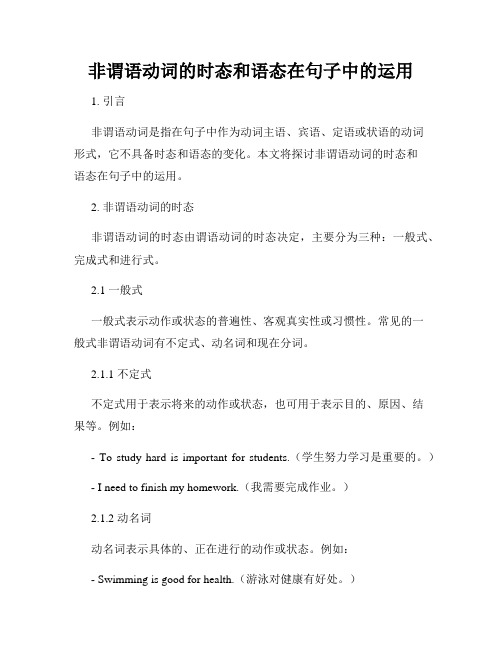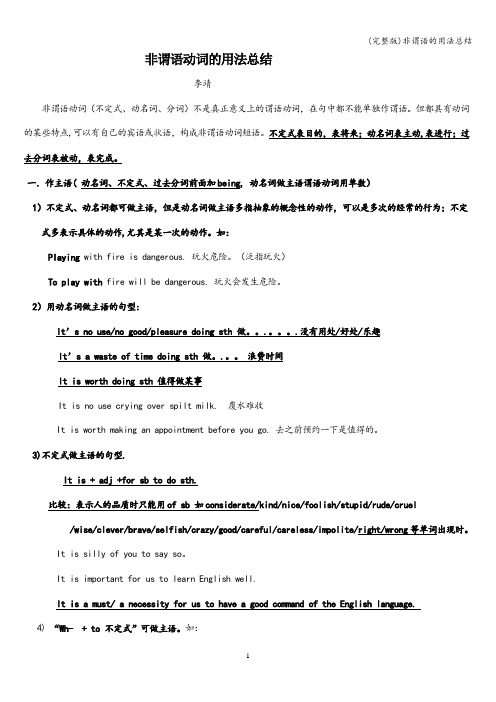非谓语动词中主动表被动论文:浅谈非谓语动词中主动表被动
非谓语动词用法表解

非谓语动词用法表解
主动 被动
定语(逻辑主语:修饰的名词或代词) 1.表将来的动作; 2.修饰被序数词、最高级或 no/all/any/only等限定的词; 3.用来修饰的词是抽象名词 1.说明被修饰名词的用途和性能 2.表正在进行(和主动)的动作 (having done/having been done不作定 语) 表已完成和被动 (vi.的-ed形式作定语只表示已完成)
being done having been done
动宾(有些动词只接-ing形式); 介宾; 形容词后宾语
过去 分词
done
X
不定式作动词后的宾语 1. I want to see him. 2. I think it better not to go. 不定式可以作介词but和except的宾语。 1. The teacher made no comments except to tell him to work hard. 老师除了叫他努力学习外,未做任何评价。 2. He had no choice but to sit there as usual. 他没有什 么选择,只好像往常一样坐在那儿。 如不定式前有行为动词do,那么在表语从句中的不定式和介 词except或but之后的不定式可不带to。 1. There is nothing we can do but wait patiently. 我们只 能耐心等待。 2. The only thing I could do was go home. 我能做的唯一 一件事就是回家。 3. They could do nothing but wait for the doctor to come. 他们只能等待医生的到来。
-ing形式作动词的宾语 能用-ing形式作宾语的及物动词可分两类,一类是只能用ing形式作宾语,另一类是既可用-ing形式作宾语,也可用不 定式作宾语。 ①只能用-ing形式作宾语的动词 这类动词只能用-ing形式作宾语,不能用不定式作宾语。 Fancy meeting you here! 想不到在这儿见到你了! I suggest doing it in a different way. 我建议用另一种方 法做这件事。 必背: 只接动词的-ing形式而不接不定式作宾语的动词有 admit 承认/ dislike 嫌恶/ include 包括/ mind 介意/ consider 考虑/ excuse 原谅/ mention 提及/ forgive 原谅 / appreciate 感激/ avoid 避免/ keep 保持/ escape 避免/ delay 耽搁/ fancy 想不到/ cannot help 情不自禁/ enjoy 喜欢/ feel like 意欲/ give up 放弃/ imagine 设想/ finish 完成/ practise 练习/ miss 逃过/ resist 抵制/ put off 推迟 / risk 冒险
非谓语动词用法总结

非谓语动词用法总结非谓语动词是历年高考英语的重要考点之一,同时也是较难掌握的难点之一。
它贯穿于英语学习和考试过程的始终。
但是,只要认真分析、透彻理解、看透本质、准确把握,就一定能在高考中运筹帷幄,游刃有余。
一.非谓语动词区别简表二.不定式的用法不定式不可作谓语,但它可以有自己的宾语、状语,构成不定式短语,在句中可以作主语、宾语、表语、定语(表用途)、状语或补足语。
高考对不定式的考查主要有不定式的时态、语态、作用、否定、省略、连词+不定式等。
作主语不定式作主语表示具体的动作,通常指一件已知的事或目的。
不定式作主语时,谓语动词用单数。
eg:To say is a thing,to do is another.(说是一回事,做是另外一回事。
)(2)不定式短语较长时,通常放在谓语之后,用it作形式主语。
eg:①It is important to learn English well.(学好英语是重要的。
)②It is necessary for us to do the job well.(我们做好这项工作是必要的。
)③It is a great honor to be invited to give a speech here.(被邀请在这儿发表演讲是一个极大的荣幸。
)2.作宾语(1)常只用不定式作宾语的动词有:want,wish,hope,long,expect,desire,intend,decid e,ask,promise,aim,offer,agree,plan,learn,choos e,refuse,fail,manage,pretend等。
eg:①He refused to help me.(他拒绝帮助我.)②She has agreed to come tomorrow.(他已同意明天来.)(2) 不定式较长时,作宾语,也可用it代替,放在后面。
eg;I find it difficult to do the job well.(3) “特殊疑问词﹢不定式to do结构”具有名词特征,可作宾语。
过去分词是非谓语动词一种形式表示完成和被动动作

2. She sat by the window, lost in thought. She sat by the window, and she was lost in thought. lost 表示一种迷失心理状态
建 2005)
A. offering
B. to offer
C. to be offered D. offered
7. __A___ with so much trouble, we failed to
complete the task on time. (四川 2006)
A. Faced
B. Face
If they had been given more attention, the cabbages could have grown better. Given more attention, the cabbages could have grown better.
作方式或伴随情况状语 没有相当的状语从句可以代替。
C. been bought
D. buying
4. When first __B___ to the market, these products enjoyed great success. (2004 全国卷II)
A. introducing B. introduced C. introduce D. being introduced 5. __D___ with the size of the whole earth,
非谓语动词的时态和语态在句子中的运用

非谓语动词的时态和语态在句子中的运用1. 引言非谓语动词是指在句子中作为动词主语、宾语、定语或状语的动词形式,它不具备时态和语态的变化。
本文将探讨非谓语动词的时态和语态在句子中的运用。
2. 非谓语动词的时态非谓语动词的时态由谓语动词的时态决定,主要分为三种:一般式、完成式和进行式。
2.1 一般式一般式表示动作或状态的普遍性、客观真实性或习惯性。
常见的一般式非谓语动词有不定式、动名词和现在分词。
2.1.1 不定式不定式用于表示将来的动作或状态,也可用于表示目的、原因、结果等。
例如:- To study hard is important for students.(学生努力学习是重要的。
)- I need to finish my homework.(我需要完成作业。
)2.1.2 动名词动名词表示具体的、正在进行的动作或状态。
例如:- Swimming is good for health.(游泳对健康有好处。
)- I enjoy reading books.(我喜欢读书。
)2.1.3 现在分词现在分词表示被动或进行的动作或状态。
例如:- The boy standing there is my brother.(站在那儿的男孩是我的弟弟。
)- The book written by him is famous.(由他写的那本书很有名。
)2.2 完成式完成式表示动作已经完成或发生在谓语动词之前。
常见的完成式非谓语动词有完成式不定式、完成式动名词和过去分词。
2.2.1 完成式不定式完成式不定式表示在谓语动词之前完成的动作。
例如:- He seems to have forgotten everything.(他似乎忘记了一切。
)- I am glad to have finished the task.(我很高兴完成了任务。
)2.2.2 完成式动名词完成式动名词表示在谓语动词之前完成的动作。
例如:- Having studied for two hours, he finally understood the concept.(经过两个小时的学习,他终于理解了这个概念。
非谓语动词用法归纳(语法)

非谓语动词用法归纳一、表格的用法doing 的用法You should try to avoid making mistakes.The book is worth reading.The book deserves reading.(2)表进行Walking on the grassland, I saw a snake.=When I was walking on the grassland, I saw a snake.The man speaking English is Tom. = The man who is speaking English is Tom.(3)表主动The man speaking English is Tom = The man who speaks English is Tom.= The man who spoke English is Tom.Nobody dinks boiling water but boiled water.= Nobody dinks water that is boiling but the water that has boiled.(4)表伴随I stand outside waiting for Mr. Chen.I lie in bed reading a novel.(5)表性质;特点The film is very moving.She is understanding, so you had better discuss your business with her.(6)概括性,一般性Climbing mountain is very interesting.Driving a car during the rush hour is tiring.在高峰时刻开车令人厌烦。
(概括性,一般性)Our work is serving the people.(7)动名词的逻辑主语为;①人称代词的所有格+动名词;②名词's+动名词。
(完整版)非谓语的用法总结

非谓语动词的用法总结李靖非谓语动词(不定式、动名词、分词)不是真正意义上的谓语动词,在句中都不能单独作谓语。
但都具有动词的某些特点,可以有自己的宾语或状语,构成非谓语动词短语。
不定式表目的,表将来;动名词表主动,表进行;过去分词表被动,表完成。
一.作主语( 动名词、不定式、过去分词前面加being, 动名词做主语谓语动词用单数)1)不定式、动名词都可做主语,但是动名词做主语多指抽象的概念性的动作,可以是多次的经常的行为;不定式多表示具体的动作,尤其是某一次的动作。
如:Playing with fire is dangerous. 玩火危险。
(泛指玩火)To play with fire will be dangerous. 玩火会发生危险。
2)用动名词做主语的句型:It’s no use/no good/pleasure doing sth 做。
.。
.没有用处/好处/乐趣It’s a waste of time doing sth 做。
.。
浪费时间It is worth doing sth 值得做某事It is no use crying over spilt milk. 覆水难收It is worth making an appointment before you go. 去之前预约一下是值得的。
3)不定式做主语的句型.It is + adj +for sb to do sth.比较:表示人的品质时只能用of sb 如considerate/kind/nice/foolish/stupid/rude/cruel /wise/clever/brave/selfish/crazy/good/careful/careless/impolite/right/wrong等单词出现时。
It is silly of you to say so。
It is important for us to learn English well.It is a must/ a necessity for us to have a good command of the English language.4) “Wh- + to 不定式”可做主语。
非谓语动词的用法
非谓语动词的用法在英语语法中,掌握好动词的用法是最重要的,而非谓语动词又是动词中非常重要的一部分,由于它们内容多,有些用法相似,所以不好掌握,经常被混淆用错,笔者通过列表比较方法,我们会对非谓语动词的用法一目了然,找出异同,更好的掌握它们的用法,下面通过列表比较的方式,分析非谓语动词的主要用法。
非谓语动词和谓语动词的相对时间关系非谓语动词相对谓语动词的时间意义例句一般式不定式不定式行为在谓语动词所表示的行为之后发生,多数是那些表愿望的词:want; hope; expect; wish等。
I want to go home.I hope to see you.不定式行为与谓语动词表示的行为同时发生,多数是那些省略不定式符号的词,一般是复合宾语。
I saw him come in.He helped him (to) carry things.一般式动名词表示动作与谓语动词表示的动作同时发出。
We enjoyed seeing the film.I am thinking of taking over the job.在动词insist on; rely on; count on(相信)等后表示动作在谓语动词表示的动作之后发生。
He insisted on doing that work在有些明确表示时间先后的动词和介词on; upon after代替完成动名词表示的动作在谓语动词表示的动作先发生。
I remember seeing him before.On arriving Beijing, he went to see his friend.一般式分词现在分词持续性动词说明分词表示的动作和句中谓语动词表示的动作同时发生。
He stood there speaking.Holding a book under his arm, he entered the room.终止性动词说明分词表示的动作发生之后,句中谓语动词表示的动作立刻发生。
最新英语中主动表被动总结
精品文档英语主动表被动用法总结一、谓语动词用主动表被动的五种情形(1) 某些连系动词(如look, sound, smell, feel, taste, prove等)要用主动表被动,因为连系动词为不及物动词,它们没有被动语态形式:That dog looks dangerous. 那只狗看起来很危险。
Your idea sounds a good one. 你的想法听起来很好。
My advice proved to be wrong. 我的意见证实是错的。
(2) 当open, close, shut, lock, move等用作不及物动词且表示主语的某种属性时,通常用主动形式表示被动意义:The door won't shut. 这门关不上。
The supermarket doors shut automatically. 超市的门是自动关的。
【注】该用法的不及物动词通常与can't, won't 等连用,注意它与用被动语态含义不同:The window won't shut. 这窗户关不上。
(说明主语的属性——窗户有问题了)The window won't be shut. 这窗户将不用关上。
(窗户本身没问题,只是不用关)有时可能用主动和被动形式均可,只是强调重点稍有不同:Suddenly the door opened. 突然门开了。
(不强调动作执行者)The door was suddenly opened. 门突然被打开了。
(强调动作执行者)(3) 当read, wash, clean, cook, cut, wear, carry等用作不及物动词且表示主语的某种属性时,通常要用主动形式表示被动意义:The cloth washes well. 这种布料好洗。
The book sells quickly. 这书销售得快。
This cheese doesn't cut easily. It's too soft. 这乳酪不容易切,太软了。
非谓语动词的形式和语态
非谓语动词的形式和语态非谓语动词在英语语法中占据着重要的地位。
它不仅可以作为动词的形式,还可以在句子中充当不同的语态。
本文将探讨非谓语动词的形式和语态,并举例说明它们在句子中的应用。
一、非谓语动词的形式非谓语动词有三种形式:不定式、动名词和现在分词/过去分词。
它们的形式和用法各不相同,下面将分别进行介绍。
1. 不定式不定式由"to"加上动词原形构成,例如:to go、to eat。
它有时可以带有助动词"to be",形成被动语态的不定式,例如:to be eaten。
不定式主要用于以下几个方面:- 表示目的或目标:I went to the store to buy some groceries.- 作为动宾结构的宾语:She wants to learn to play the piano.- 用于形容词后面修饰名词:She is the person to ask for help.2. 动名词动名词是动词加上-ing形式构成,例如:going、eating。
它可以作为主语、宾语、表语、介词宾语等。
动名词主要用于以下几个方面:- 作为主语:Swimming is my favorite hobby.- 作为宾语:I enjoy playing basketball.- 作为表语:Her favorite activity is dancing.3. 现在分词/过去分词现在分词由动词原形加上-ing构成,过去分词则根据动词的不同形式而变化,例如:going、eaten。
它们可以作为形容词修饰名词。
现在分词和过去分词主要用于以下几个方面:- 作为非限定性定语:The dog, barking loudly, scared the mailman.- 作为限定性定语:I saw a broken glass on the floor.- 作为表语:The situation seems confusing.二、非谓语动词的语态非谓语动词在句子中可以具有主动语态或被动语态。
主动表被动的几种情形
Grammar 1Passive voice: present and past forms (P5)一.何时用被动语态?1.不知道谁是动作的执行者时;①Paper is made from wood.②He was wounded in the fight.2.没有必要或不想指出动作的执行者时;Books and newspapers in the reading room mustn’t be taken away.3.强调或突出动作的承受者时;She was heard to move about in her room uptairs.如果需要指出被动的执行者,可用“by + 动作执行者(宾格)”这一结构。
二.主动表被动的几种情形:一、谓语动词用主动表被动的四种情形:(1)某些连系动词主动表被动:look, sound, smell, taste, prove, feelThis kind of cloth feels soft.That dog looks dangerous.My advice proved (to be) wrong.(2) 当open, close, shut, lock, move等用做不及物动词且表示主语的某种属性时,通常用主动形式表示被动意义。
他们通常与can’t, won’t等连用。
The door won’t shut.Suddenly the door opened. (不强调谁开了门)(3)当read, write, wash, sell, clean, cook, burn, draw, cut, wear等词与well, easily, quickly 等副词连用时,常用主动表被动。
The cloth washes well.The poem reads smoothly.The book sells well.This cheese doesn’t cut easily. It’s too soft.This shirt will wear very long.The floor doesn’t clean easily.This kind of rice cooks more quickly than that kind.但:This book sells well. So far, 200 books have been sold out.The sentence was read clearly by her.(4)某些表示开始和结束的动作(begin, start, finish, end, etc.),当主语是事物且不强调动作的执行者时,可用主动表被动。
- 1、下载文档前请自行甄别文档内容的完整性,平台不提供额外的编辑、内容补充、找答案等附加服务。
- 2、"仅部分预览"的文档,不可在线预览部分如存在完整性等问题,可反馈申请退款(可完整预览的文档不适用该条件!)。
- 3、如文档侵犯您的权益,请联系客服反馈,我们会尽快为您处理(人工客服工作时间:9:00-18:30)。
非谓语动词中主动表被动论文:浅谈非谓语动词中主动表被
动
一般来说,非谓语动词的主动式表示主动动作,被动式
表示被动动作。例如:he enjoys reading novels on sundays.
但在某些句式中并非如此,有时很容易把非谓语动词的
主动式误用为被动式。例如:the book is well worth being
read.(×).the book is well worth reading.(√)
下面列举教学中常见的集中易误用被动式的非谓语动
词句式结构,供大家参考:
1、不定式玉疑问代词连用,用主动式。例如:(1)i don't
know which one to buy.(2)i wonder if you know what to
do now.
2、在“be worth doing、be missing、in need of”
等结构中,动名词应用主动式,动名词的逻辑宾语为句子主
语,例如:the film is worth seeing.it's hardly worth
troubling about.his teaching method is in need of.
3、不定式在句中既有逻辑宾语,又有逻辑主语,且与
逻辑主语为主谓关系,不定式应用主动式。please give me
a chair to sit on.the man is not easy to get along with.
4、在“主语+be+表语+不定式”句中,如不定式的逻辑
宾语为句子的主语时,常用主动式。在某些“形容词+不定
式”结构中,若不定式与句子的主语构成动宾关系,则常用
主动表示被动,此类形容词有:difficult easy hard
interestingpleasant nice bitterfit dangerouslight
heavy important necessary
5、在动词want,need,require等词后用动名词主动
式,其含义表示被动,相当于不定式的被动式。例如:the
houseneedsrepairing.(=to be tepaired )
6、在“there be”句型中,不定式多用主动式,有时
也用被动式。例如:there is much housework to do /to be
done.
7、有些说法已成习惯用法,不可随意改变,在这些句
式中,分词。不定式作插入语,与句子主语无主动或被动关
系。
8、在英语中,act add bend close burn lock cut begin
tear move open read sell teach translate fit wash wear
write 等常用主动形式来表示被动意义,其主语往往是物。
9、有一些表示感觉和变化的连系动词通常用主动表被
动。
10、介词短语作表语或定语时用主动表示被动。
巩固练习:
1)i'veworked with children before,so i know whatin
my new job.
a.expectedb.to be expectingc.to expectd.exepects.
2)when i handed the report to john,he said that
george was the person .
a.to sendb.for sendingc.to send it tod.fo sending
it to.
3)the classroom requires .
a.cleaningb.to clearnc.cleaned d.being cleaned.
4)i find english hard.
a. to learn b.to be learned c.to learn itd.being
learned.
5)the oldman is worth.
a. looking afterb.being looked after c.lookingd.to
be looked after .
6)nobody noticed the thief into the house because
the linghts happened to.
a.be put upb.give inc.be turned d.go out .
7)the question referred to is difficult.
a.to be answeredb.answered c.to
answerd.answering.
8)this page needs again.
a.being cheekedb.checkedc.to check d.to be
checked.
9)with a lot of different problems,the
newly-elected president is having a hard time.
a.settled b.settlingc.to settled.being settled.
10)he let me repeat his instruction sure that i
understand what was after he went away.
a.to make,to dob.making, doing c.to make,to do
d.making,to do
11)he was expected to make a speech when he was well
enough but unfortunately he was even worse the next day.
a.to be held b.held c.to holdd.to have been held.
12)the meatdad.
a、gob、goes c、has gone d、going
参考答案
1)c2)c3)a4)a5)a6)d7)c8)d9)c10)a11)a12)c
